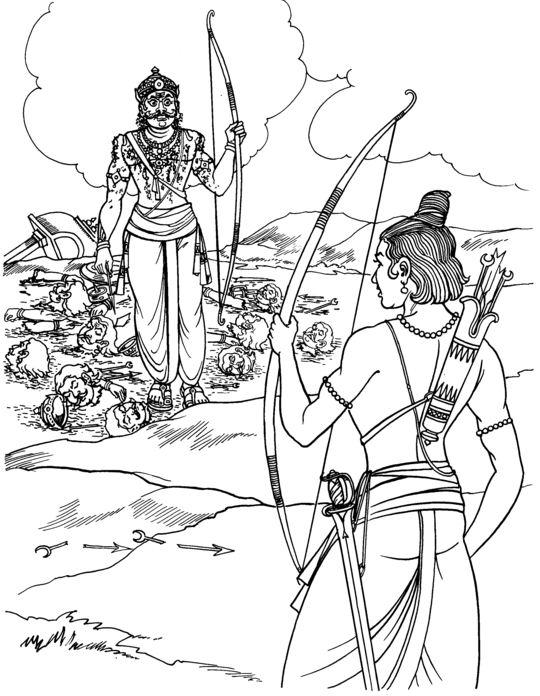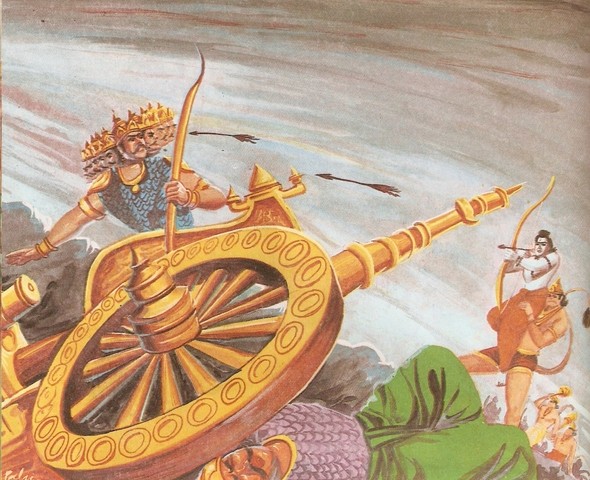SALUTATION TO RAHUVEERAN
VisAla netram paripurNa gAthram
SitA kaLathram sura vairi jaithram |
Jagath pavithram paramathma tanthram
Sri Ramachandram praNamAmi chitthE ||
— Sri Rama KarNAmrutham 4. 27
GS: 58 — katuratath atani dankruthi chatula katOra kArmukha visikha vithAtana vigaditha makuta vihvala visravastanaya visrama samaya visrANana vikhyAtha vikrama! Jaya! Jaya!
(Meaning): Hail to Thee, O Raghuveera, who through your compassionate act of letting RavaNa leave the battle field and rest overnight to restore his strength, when the agitated RavaNA could not match your prowess in the battle field! The ferocious sounding arrows leaving your bow did their powerful work and split into pieces thecrowns of the ten-headed RavNA and made him fear for his life. Seeing his weak state, You as a noble warrior did not want to take advantage of him, when he was weak and unable to defend himself. You permitted him to retire from the battle field and then return the next day after a well-needed rest in his palace.
(Background): RavaNA sent his commander-in-chief, PrahasthA to the battle field as the simian army led by NilA destroyed many divisions of his army. Prahastha caused a lot of damage to the army of monkeys, who fought only with uprooted trees and pieces of rocks. In a fierce battle, NilA threw a big rock over the head of Prahastha and shattered his head and killed him. RavaNA was disconsolate over the death of his commander-in-chief and decided to take control of the battle in his own hands. He appeared on the battle field and immediately began to make short work of the monkey chieftains. He stupefied Sugriva with a swift arrow. He struck Hanuman in the chest and sent him reeling. Then he began to torment NilA, who had earlier killed PrahasthA, his commander-in-chief. With great agility, NilA evaded RavaNA and perched himself on the banner of the chariot of RavaNA. The angry RavaNA dispatched an arrow empowered by Agni at NilA, the son of Agni. NilA’s life was spared by his father, but he was knocked unconscious.
The triumphant RavaNA gloated with pride now dashed towards LakshmaNA and sent a flurry of arrows at him. LakshmaNA sent his own arrows flying at the speed of lightning and tore the arrows of RavaNA in flight. LakshmaNA cut the bow of RavaNA in to three pieces with his arrows and bathed RavaNA in a shower of sharp arrows. The enraged RavaNA struck LakshmanA with a javelin given to him by Brahma and grievously hurt LakshmanA with it and knocked him off his feet. The ten-headed king of Ogres came down from his chariot and tried to lift and carry away LakshmaNA as a trophy. The great RavaNA, who had once lifted Kailasa mountain could not however succeed in lifting LakshmaNA. Meanwhile, Hanuman had recovered from his earlier battle with RavaNA and rushed to the side of the fallen LakshmaNa. He gave a mighty blow to RavaNA and sent him reeling. Hanuman used that moment to lift and carry off the unconscious LakshmaNA to the side of the worried Rama. Hanuman had no problem lifting LakshmaNA, while RavaNA could not succeed in his efforts.
HanumAn now appealed to Rama and requested Rama to subdue the king of ogres and to fight him, while being mounted on his shoulders. RavaNA was standing in his chariot and Rama confronted him from his perch on the shoulders of Hanumaan. In a fierce battle, Rama tore up into pieces RavaNA’s chariot with its wheels, horses, standard, canopy, the charioteer and the weapons stored on the sides of that mighty chariot. Next, Rama hit RavaNA in the chest with a fiery arrow and RavaNA reeled and began to swoon. With another cresent-shaped arrow shining like fire, Rama tore the diadem of the king of ogres. Now, RavaNA looked like a poisonous snake divested of its poison. Rama sized the situation quickly and recognized that RavaNA was in no shape to continue the fight and could easily be killed then and there. Out of his sense of fairness and compassion, Rama praised RavaNa for the earlier display of his great skills in the battle field and told him that He (Rama) will not elect to kill him then, when he (RavaNA) was in no shape to continue the fight. Rama”s words were:
krutham tvayA karma mahath subheemam
hatapraveerasccha kruthastvayaaham |
tasmaath parisrAntha ithi vyavasya
na tvaam sarai: MRUTHYU VASAM NAYAAMI ||
prayAhi jAnAmi raNArdhitastvam
pravisya raathrim chararAja lankhAm |
aasvasya niryAhi rathee cha dhanvee
tadhA balam prekshyasi mE rathastha: ||
(Meaning): A great and exceedingly difficult task has been accomplished by you in killing many of my heroic simian chieftains and overpowering Sugreeva, Hanumaan, NilA and LakshamNA. I recognize that you are battle-fatigued. Hence, I would not kill you now and dispatch you to the world of Yama. You are not in any shape to stand up and continue your fight with me. Hence, I give you permission to leave the battle field. Reenter LankhA, rest a while and return with a new chariot and weapons. Then, you can witness my strength.
Consoled by the words of the compassionate Rama, the mighty RavaNA shorn of his vanity, pride and joy hastily left the battle field in disgrace and returned to his palace. After RavaNA left, Rama and the recovered LakshmaNA toured the battle field and removed the arrows from the limbs of the brave monkey chieftains, who had been wounded in their battle with RavaNA before Rama came to their rescue. The oudhAryam and the heroism of Rama is celebrated in this famous, fifty ninth canto of Yuddha Khaandham by sage Vaalmiki.
The Concluding salutaton to Raghuveeran:
jAnAthi Rama! tava tatttvagathim HanUmAn
jAnAthi Rama! tava sakhyagathim kapeesa: |
jAnAthi Rama! tava Yuddhagathim dasAsyO
jAnAthi Rama! dhanadhAnuja yeva sathyam ||
—- Sri Rama KarNaamrutham 4. 17
Sri HanUmath Sametha Raghuveera ParabrahmaNE nama:
Sri VaishNava Daasan,
Oppiliappan Koil VarAdAchari Sadagopan
To be continued…










